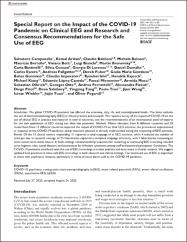| dc.contributor.author | Campanella, Salvatore | |
| dc.contributor.author | Arıkan, Kemal | |
| dc.contributor.author | Babiloni, Claudio | |
| dc.contributor.author | Balconi, Michela | |
| dc.contributor.author | Bertollo, Maurizio | |
| dc.contributor.author | Betti, Viviana | |
| dc.contributor.author | Bianchi, Luigi | |
| dc.contributor.author | Brunovsky, Martin | |
| dc.contributor.author | Buttinelli, Carla | |
| dc.contributor.author | Comani, Silvia | |
| dc.contributor.author | Di Lorenzo, Giorgio | |
| dc.contributor.author | Dumalin, Daniel | |
| dc.contributor.author | Escera, Carles | |
| dc.contributor.author | Fallgatter, Andreas | |
| dc.contributor.author | Fisher, Derek | |
| dc.contributor.author | Giordano, Giulia Maria | |
| dc.contributor.author | Güntekin, Bahar | |
| dc.contributor.author | Imperatori, Claudio | |
| dc.contributor.author | Ishii, Ryouhei | |
| dc.contributor.author | Kajosch, Hendrik | |
| dc.contributor.author | Kiang, Michael | |
| dc.contributor.author | Lopez-Caneda, Eduardo | |
| dc.contributor.author | Missonnier, Pascal | |
| dc.contributor.author | Mucci, Armida | |
| dc.contributor.author | Olbrich, Sebastian | |
| dc.contributor.author | Otte, Georges | |
| dc.contributor.author | Perrottelli, Andrea | |
| dc.contributor.author | Pizzuti, Alessandra | |
| dc.contributor.author | Pinal, Diego | |
| dc.contributor.author | Salisbury, Dean | |
| dc.contributor.author | Tang, Yingying | |
| dc.contributor.author | Tisei, Paolo | |
| dc.contributor.author | Wang, Jijun | |
| dc.contributor.author | Winkler, Istvan | |
| dc.contributor.author | Yuan, Jiajin | |
| dc.contributor.author | Pogarell, Oliver | |
| dc.date.accessioned | 2021-01-11T08:03:01Z | |
| dc.date.available | 2021-01-11T08:03:01Z | |
| dc.date.issued | 2021 | en_US |
| dc.identifier.citation | Campanella, S., Arıkan, K., Babiloni, C., Balconi, M., Bertollo, M., Betti, V. ... Pogarell, O. (2021). Special report on the impact of the COVID-19 pandemic on clinical EEG and research and consensus recommendations for the safe use of EEG. Clinical EEG and Neuroscience, 52(1), 3-28. https://dx.doi.org/10.1177/1550059420954054 | en_US |
| dc.identifier.issn | 1550-0594 | |
| dc.identifier.issn | 2169-5202 | |
| dc.identifier.uri | https://dx.doi.org/10.1177/1550059420954054 | |
| dc.identifier.uri | https://hdl.handle.net/20.500.12511/6215 | |
| dc.description.abstract | Introduction. The global COVID-19 pandemic has affected the economy, daily life, and mental/physical health. The latter includes the use of electroencephalography (EEG) in clinical practice and research. We report a survey of the impact of COVID-19 on the use of clinical EEG in practice and research in several countries, and the recommendations of an international panel of experts for the safe application of EEG during and after this pandemic.Methods. Fifteen clinicians from 8 different countries and 25 researchers from 13 different countries reported the impact of COVID-19 on their EEG activities, the procedures implemented in response to the COVID-19 pandemic, and precautions planned or already implemented during the reopening of EEG activities.Results. Of the 15 clinical centers responding, 11 reported a total stoppage of all EEG activities, while 4 reduced the number of tests per day. In research settings, all 25 laboratories reported a complete stoppage of activity, with 7 laboratories reopening to some extent since initial closure. In both settings, recommended precautions for restarting or continuing EEG recording included strict hygienic rules, social distance, and assessment for infection symptoms among staff and patients/participants.Conclusions. The COVID-19 pandemic interfered with the use of EEG recordings in clinical practice and even more in clinical research. We suggest updated best practices to allow safe EEG recordings in both research and clinical settings. The continued use of EEG is important in those with psychiatric diseases, particularly in times of social alarm such as the COVID-19 pandemic. | en_US |
| dc.description.sponsorship | Fonds de la Recherche Scientifique - FNRS; Brugmann Foundation (CHU Brugmann, Brussels, Belgium); European Committee; European Research Council (ERC); Ministry of Defence; Ministry of Education, Youth and Sports of the Czech Republic under the NPU I program; 3rd Faculty of Medicine, Charles University in Prague; Generalitat de Catalunya; ICREA; Maria de Maeztu Unit of Excellence; Canadian Institutes of Health Research (CIHR); Natural Sciences and Engineering Research Council of Canada CGIAR; Research Nova Scotia; Ministry of Education, Culture, Sports, Science and Technology, Japan (MEXT); Miner's Lamp Innovation Fund in the Prevention and Early Detection of Severe Mental Illness ; Academic Scholar Award, at the University of Toronto (Department of Psychiatry; Canadian Institutes of Health Research (CIHR); Portuguese Foundation for Science and Technology; Hans und Marianne Schwyn Stiftung; Stiftung zur Forderung von Psychiatrie und Psychotherapie; United States Department of Health & Human Services; National Institutes of Health (NIH) - USA ; National Research Development and Innovation Office of Hungary; National Natural Science Foundation of China (NSFC); Catholic University of Milan (Italy) | en_US |
| dc.language.iso | eng | en_US |
| dc.publisher | SAGE Publications Inc | en_US |
| dc.rights | info:eu-repo/semantics/openAccess | en_US |
| dc.subject | COVID-19 | en_US |
| dc.subject | Psychiatry | en_US |
| dc.subject | Resting State Electroencephalography (Rseeg) | en_US |
| dc.subject | Event-Related Potentials (Erps) | en_US |
| dc.subject | Event-Related Oscillations (Eros) | en_US |
| dc.subject | Quantitative EEG (Qeeg) | en_US |
| dc.title | Special report on the impact of the COVID-19 pandemic on clinical EEG and research and consensus recommendations for the safe use of EEG | en_US |
| dc.type | editorial | en_US |
| dc.relation.ispartof | Clinical EEG and Neuroscience | en_US |
| dc.department | İstanbul Medipol Üniversitesi, Tıp Fakültesi, Temel Tıp Bilimleri Bölümü, Biyofizik Ana Bilim Dalı | en_US |
| dc.authorid | 0000-0002-0860-0524 | en_US |
| dc.identifier.volume | 52 | en_US |
| dc.identifier.issue | 1 | en_US |
| dc.identifier.startpage | 3 | en_US |
| dc.identifier.endpage | 28 | en_US |
| dc.relation.tubitak | info:eu-repo/grantAgreement/TUBITAK/SOBAG/214S111 | |
| dc.relation.publicationcategory | Diğer | en_US |
| dc.identifier.doi | 10.1177/1550059420954054 | en_US |
| dc.identifier.wosquality | Q4 | en_US |
| dc.identifier.scopusquality | Q2 | en_US |


















